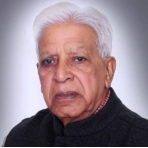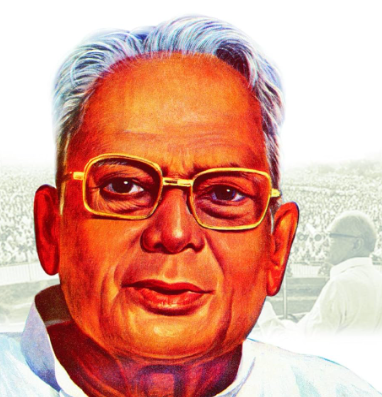THE ASIAN INDEPENDENT, UK-
 Dr. Ramjilal, Social Scientist, Former Principal, Dayal Singh College, Karnal (Haryana-India)
Dr. Ramjilal, Social Scientist, Former Principal, Dayal Singh College, Karnal (Haryana-India)
Email. [email protected]
During the Indian National Movement, an attempt was made to mobilise the people on the basis of ideologies. The Gandhian ideology, the communist ideology, revolutionary ideology and socialist ideology were the main ones among these ideologies. Among the Indian socialist thinkers and leaders, Acharya Narendra Dev, Jawaharlal Nehru, Jayaprakash Narayan, Dr. Ram Manohar Lohia, Achyut Patwardhan, Ashok Mehta, Minoo Masani, etc. were the main names. Loknayak Jayaprakash Narayan (11 October 1902– 8 October 1979) has a glorious place and contribution in the history of the Indian National Movement and independent India as a socialist thinker and philosopher. Jayaprakash Narayan’s role among the supporters of socialist ideology is glorious and unique.
He was born on 11 October 1902 in Sitab Diara, a village in Bihar. His father’s name was Harsudayal, and his mother’s name was Phool Rani. He received his primary education in his village and matriculation and intermediate education in Patna. Due to the influence of Mahatma Gandhi, thousands of young men and women jumped into the Non-Cooperation Movement (4 September 1920—12February 1922). Jayaprakash Narayan also left his studies and participated in the non-cooperation movement. From 1922 to 1929, Jayaprakash received higher education in the United States. During his stay in America, he faced many difficulties in living and studying. He earned his living by working as a labourer. As a result, he also understood the importance of labour in life. While living in America, he deeply studied the thoughts of Karl Marx, V.I. Lenin, J. Lovestone, and India’s famous Communist thinker, M.N.Roy,and he became an ardent follower of Communism. Being a communist, Jayaprakash Narayan believed that, along with national political independence, social-economic equality and justice are very important for a dignified life. But due to the dictatorship of the Communist Party in the former Soviet Union (now Russia), the narrow outlook of the leaders of the Communist Party of India (CPI), the influence of Mahatma Gandhi, Jawaharlal Nehru, and his wife, Mrs. Prabhavati, and Indian conditions, Jayaprakash Narayan could not become a staunch Communist, and due to the intensity of national sentiment, he turned away from communism forever.
After returning to India from the USA in 1929, he joined the Congress Party at the invitation of Jawaharlal Nehru. He started conducting the party’s labour activities at the Congress headquarters in Allahabad (U.P.).
In 1930, the Civil Disobedience Movement (1930–1934) was launched under the leadership of Mahatma Gandhi, and Jayaprakash Narayan participated in this movement. As a result, he was arrested and sentenced to one year of rigorous imprisonment and was lodged in Nasik jail. While in Nasik jail, he met the then young socialists—Achyut Patwardhan, Ashok Mehta, Minoo Masani, and other national leaders. As a result, after his release from jail, Jayaprakash Narayan played a very important role in the establishment of the Congress Socialist Party (left wing of the Congress Party) in 1934. He was one of the the founders and general secretary of this party. The aim of the Congress Socialist Party was to establish an exploitation-free society. In other words, it was to establish a society where man is not exploited by man. As a socialist thinker and politician, he supported the theory of socio-economic reconstruction of Indian society and opposed capitalism, liberalism, and imperialism. On the one hand, he advocated state control over the means of production, distribution, and exchange; on the other hand, he also opposed the dictatorship of the working class (Communist Party).
Like the other adventurous nationalists, revolutionaries, and leftists of India, Jayaprakash Narayan also considered the Second World War (1939–1945) as a ‘golden opportunity’ for India’s independence.He emphasised the use of all means—non-violent, violent, and revolutionary means to over throw the imperialist rule in India. During the Quit India Movement (1942), Jayaprakash Narayan along with his 5 companions, succeeded in escaping from Hazaribagh jail. To get rid of the British imperialist rule, he established ‘Azad Dastas’ to run an ‘underground guerrilla movement’. The Government of India announced a reward of Rs 5000 for the person who would capture Jayaprakash Narayan alive or help in capturing him. Later, this amount was also increased to Rs. 10,000. Jayaprakash Narayan was arrested from Lahore Railway Station on 18 September 1943, and endured inhuman torture for 50 days in Central Jail, Lahore and followed the revolutionary tradition of indomitable courage, personal bravery, immense love for the nation, boundless patriotism, strong commitment to ideology and sticking to his vow. After his release from jail on 1 April 1946, Jayaprakash Narayan propounded the ‘Theory of People’s Revolution’.
Jayaprakash Narayan was an epitome of sacrifice. He did not accept any government post in independent India. The present politicians should learn from the sacrifice of Jayaprakash Narayan and other freedom fighters. In fact, most of the present politicians are not the epitome of sacrifice and neither are they have any commitment towards any ideology. Rather, they are like chameleons for power. Just as a chameleon changes its colour, politicians change parties in the same manner. This political opportunism is a big threat to Indian democracy.
In 1954, Jayaprakash Narayan left politics and joined the Sarvodaya movement as a “Jeevan Daani” and provided ideological and theoretical basis to the “Bhoo-Daan-Gram-Daan Andolan”. Jayaprakash Narayan remained “Sarvodayavadi” from 1954 to 1974. Due to corruption, poverty, inflation, unemployment, the politics of power struggle, a rise in the values of totalitarian power, and a decline in moral values, Jayaprakash Narayan returned to active politics and led the students’ movement by establishing an organisation called ‘Youth for Democracy’. On 5 June 1974, while addressing a huge gathering of about 5 lakhs people In Patna, he propounded the theory of ‘total revolution’ (Sampurna Karanti). The Total revolution is the sum of seven revolutions—social, economic, political, cultural, ideological, educational, and spiritual revolution. Total Revolution had the support and active contribution of students as well as opposition parties. A movement was initiated to overthrow Mrs. Indira Gandhi and the Congress Party out of power. According to the predetermined plan, to crush the total revolution, Mrs. Indira Gandhi advised the then President of the country, Fakhruddin Ali Ahmed, to declare an internal emergency in India using Article 352 of the Indian constitution.
Consequently, a national emergency was declared on the mid night of 25 June 1975 without any prior warning. As soon as the emergency was imposed, political opponents were arrested under the Internal Security Act (MISA). The main top national leaders were Jayaprakash Narayan, Morarji Desai, and George Fernandes, Ghanshyam Tiwari, LK Advani, and Atal Bihari Vajpayee. Apart from These national leaders, thousands of people were arrested and put in jails, and restrictions were imposed on the news papers, and the fundamental rights enshrined in the Constitution were also suspended. This internal emergency in India remained in force from 25 June 1975 to 21 March 1977, i.e. ,for 21 months. Jayaprakash Narayan had addressed it as ‘the darkest period in Indian history’. On 18 January 1977, the Lok Sabha was dissolved by the President of India and elections for the sixth Lok Sabha were held from 16 March to 20 March 1977. The President announced the end of the emergency on 23 March 1977. In the Lok Sabha elections, the seats of the Congress Party decreased from 350 to 153. The senior Congress leaders, including Mrs. Indira Gandhi, had to face defeat in the elections. With the efforts of Jayaprakash Narayan, balance was established between the various components of the newly formed Janata Party and Morarji Desai was appointed the Prime Minister of India. In other words, Jayaprakash Narayan became a Loknayak and king-maker. After almost thirty years of independence, a non-Congress government was formed at the centre. This was revolutionary historical turning point in Indian politics. Jayaprakash Narayan died on 8 October 1979 due to poor health. He was posthumously awarded the Bharat Ratna, the highest civilian award in India, in recognition for his great contribution in the field of social services. Vinoba Bhave, while paying his tribute after the death of Jayaprakash, said that he considered himself only a “Lok-sevak,” or servant of the people.
In the present times, due to increasing economic inequality, a deep gap between the rich and the poor, inflation, extreme unemployment, corruption, hunger, religious fanaticism, communalism, authoritarianism, and misuse of power by the governments, the relevance of Jayaprakash Narayan’s thoughts is more than that of 1974-1975.
(Note: Dr. Ramjilal is the author of Political India 1935-42: Anatomy of Indian Politics (Ajanta Publications, Delhi, 1986).)








